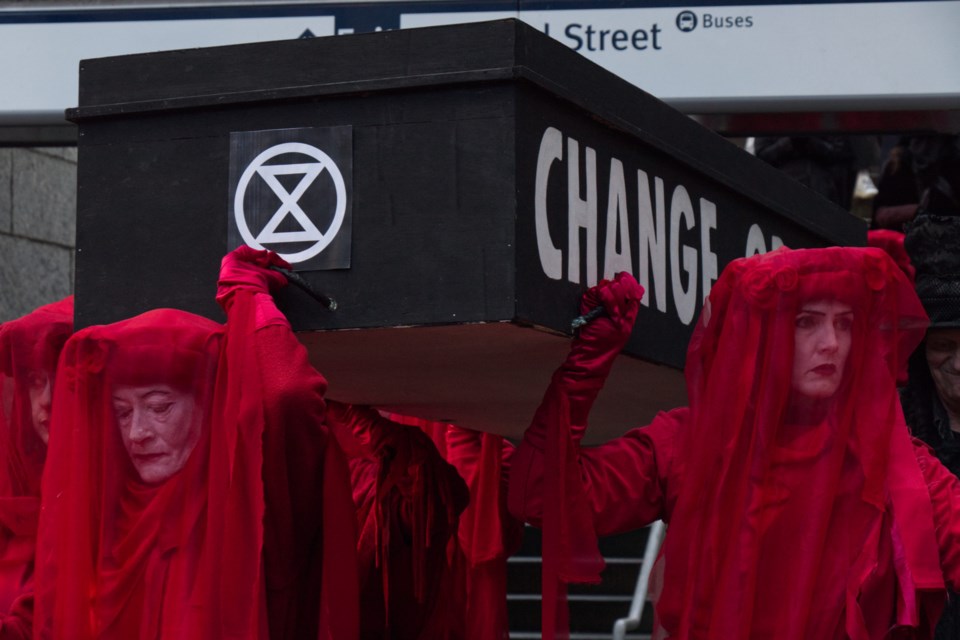When analyzing extremists and attempting to introduce reason into public commentary, timing is everything. Apparently, when it comes to one radical, I wrote three previous columns too early.
One pointed out doomsday prophets have migrated from religious traditions to the green activist movement; another noted how transitions cannot be commanded as if one were a deity or Mother Nature; and a third pointed out how climate-related deaths are down 95 per cent in the past century.
I say “too early” because as it happens, Roger Hallam, founder of the Extinction Rebellion movement, recently compared his concern over carbon emissions, to the Holocaust. Hallam denied there was any difference between his belief that climate change is the greatest threat to civilization, and the actual genocide of six million Jews and others.
Hallam apparently sees no difference between his manufactured madness-of-crowds panic, and those herded on to trains and shipped to Nazi concentration camps. Any reasonable human being should be clear on the difference between Hallam’s media events and actual victims in history who were worked to death, starved, and gassed by other human beings
Hallam is now an excellent example of all three radical mistakes I’ve noted in previous columns: The belief that the world is ending which comes from the apocalyptic strains in the Jewish and Christian traditions; hubris that people can immediately replace oil and natural gas with alternative sources that lack the same energy “punch”; and that climate disasters and deaths are worse now when they are in fact lessening.
To such mistakes Hallam is now an example of another fourth deadly horse of the doomsday apocalypse crowd—its anti-human impulse which on occasion morphs into offensive, hysterical comparisons. We saw the anti-human tack recently in calls for people to have less children (or none at all). We see the hysteria in the mind of a fanatic, Hallam, who equates carbon emissions to the Holocaust. Hallam argued that “The terrible emotion Auschwitz caused has not been hidden, and the same needs to apply to the climate crisis. Only emotion drives people to make a difference.”
Only Hallam seeks to enlist the genocidal event of the 1940s, with the modern technical problem of mitigating some carbon emissions while not simultaneously wrecking modern civilization.
Hallam doubled down in his interview, arguing he “fully acknowledge[d] the unimaginable suffering caused by the Nazi holocaust,” only to then argue it was not unique.
Thus, he asserted the Holocaust was “happening again, on a far greater scale, and in plain sight,” again comparing Adolf Hitler’s Holocaust to his concern over CO2 in the atmosphere while “simultaneously erecting ever greater barriers to immigration, turning whole regions of the world into death zones.” And Hallam tripled down soon afterward when he offered a German newspaper this analogy: “Climate change is just the tubes that the gas comes down in the gas chamber. It's just a mechanism through which one generation kills the next generation.”
The extremism in Hallam’s comparison and thus his mind speaks for itself. But he is even wrong to suggest that “whole regions of the world” have turned into “death zones.” In fact, much of the world has progressed over the last 200 and then the last 50 years, the southern and poorest countries among them. Extreme poverty, defined as US $1.90 (adjusted for inflation in the following comparisons and thus apple-to-apple) described 94 per cent of human beings in 1820. That figure declined to 35 per cent by 1990, and to 9.6 per cent by 2015.
While some regions and nations lag, as Human Progress has found, 40 per cent of the world’s extreme poverty population exists in just two countries, Nigeria and India. And even in those nations, substantial progress has occurred: average income has tripled in the past three decades in India. In Nigeria, gross domestic income is up over 800 per cent to $2,450 from $270 two decades ago.
The exception to that generally positive trend has been nations run by ideologues/radicals, the corrupt, incompetents, or all three.
Back to Hallam’s British newspaper interview, where he said the Holocaust was not unique: “For me it’s just another f–ery in human history,” he said, then lectured Germans that they were “traumatized” by their own past, which has made them incapable of learning.
Actually, as one who just wrote a book on how some people and even a plurality of populations in some nations see themselves as permanent victims whether they are or not, Germany’s problem between the early 19th century and 1945 was—back then— a deep sense of misplaced victimhood combined with spurious anti-scientific racism that led to one of history’s most inhuman and anti-human regimes.
That ended in the destruction of Germany in 1945. Since then, Germans are not paralyzed by their history, but have instead learned from it. It’s why they are quick to reject fanatics. In the German newspaper interview, the reporter even asked, in astonishment, “You're comparing climate change to the systematic murder of millions of Jews in Nazi Germany? You can't be serious.” All Hallam said in response was that a lot of activists did not agree with his Holocaust comparison.
Except the core problem is that Hallam and other radical activists have long ago leapt from reason to hysteria. The rest of us should decline to join their fundamentalist and fundamentally anti-human crusade.
Mark Milke is an independent public policy analyst. His newest book is The Victim Cult: How the culture of blame hurts everyone and wrecks civilizations.
SWIM ON:
- How do we avoid - or at least survive - catastrophe? Mark Milke on the most potent weapon against disaster.
- Jody Vance on Greta Thunberg and the movement that has sprung up in her wake.
- Blame the blob? Bob Price on the new reality for BC's salmon industry, and the bizarre phenomenon that might be causing it.



